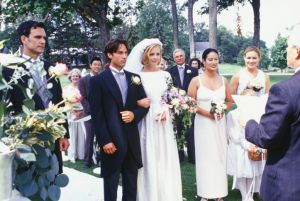
A wedding celebration is the culmination of a hundred or so tasks. Luckily, resources abound. Dozens of magazines, blogs and wedding planner websites can help you organize the wedding of your dreams, down to the last detail. As you head down the tulle and flower-festooned rabbit hole of Etsy, however, do not forget what may be the most critical arrangement. You want to ensure, well before the big day, that your chosen officiant is legally able to marry you.
Marriage laws vary state to state, and sometimes county to county. Over the past several decades, thousands of people have taken advantage of ministries such as the Universal Life Church to become ordained in order to perform a loved one's marriage ceremony. In many places across the country, becoming ordained qualifies a person to legally perform the service. It would be a mistake, however, to assume that your location automatically accepts the ordination or that it does not have any additional requirements to make your officiant, well, official.
Vow to Do Your Research
Getting your chosen officiant squared away takes the same sort of planning you would put into confirming the band or reviewing the menu with the caterer. For example, perhaps it is a dream of yours to have a dear brother or sister perform the service for you and your partner. After you make the request, he or she can simply go online and submit to the quick process of becoming ordained. As the officiant, he or she now has the responsibility not only to help you construct a memorable service, but also to make certain that all legal requirements are met well in advance of the ceremony. Plan to meet with your officiant a couple of times to outline and discuss your wishes for the ceremony as well as to confirm that all the T's are crossed and the I's are dotted. The following tasks should be on the legal officiant's to-do list:
- Become a Minister on Get Ordained™.
- Contact the local marriage authority. This is most often the county clerk. Ask if there are any additional requirements beyond ordination to have the ceremony be legally binding.
- Secure any official documents from the ministry. Plan ahead, as this may take a few weeks.
- Perform the service. Arrange for the signing and timely return of the marriage license to the appropriate office.
Some states require that an officiant register as a minister with the authorities before a service can be performed legally.
Piece of Paper
Some couples are more concerned with sharing a loving and open proclamation of their commitment to one another before friends and family and less concerned with the actual legality of the service. While these couples may not care about making their union strictly legal, there can be repercussions for a failure to marry in the eyes of the law. The consequences can be dire indeed if the couple was under the impression that the marriage was legal in the first place and comes to find that that is not the case. Couples can experience red tape and complications with medical issues, property division and taxes. Not all states honor common law marriage rights. People who believed they shared a life may come to realize that they do not legally share much at all.
Make It Lovely, Make It Stick
Certainly, a courthouse wedding gets the job done. There are couples, however, who may not adhere to a specific religious practice but who nonetheless envision a celebration infused with the kind of joy, warmth and intimate spirituality seldom found at city hall. Ministries that offer online ordination allow the people closest to you to participate fully in your celebration. In helping you to facilitate your union, be certain that your officiant has taken the steps to make it legal as well as picture-perfect.
Add Your Comment